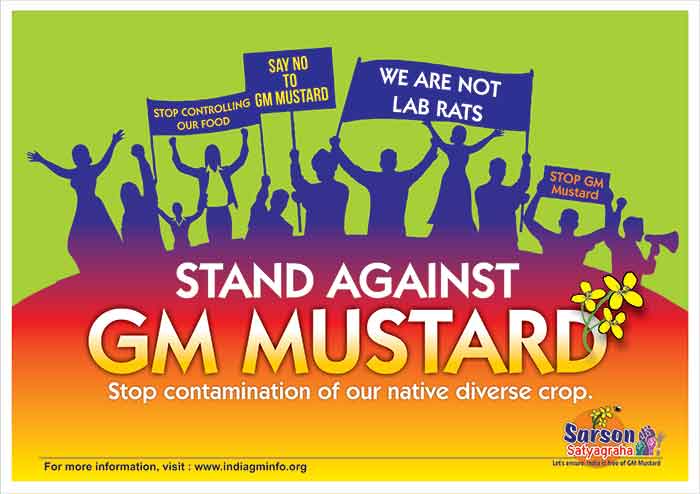
Those who understand the terrible implications of the onslaught of the GM lobby (genetically modified food and crops lobby) on Indian farming and farmers and are devoted to protecting India’s farmers and farming from this onslaught had reason to be both happy and sad this week ( August-end)
Happy because the Supreme Court acted with so much wisdom and firmness when it withstood the pressures exerted by the government for allowing cultivation of GM Mustard. A bench comprising Justices B V Nagarathna and Ujjal Bhuyan said—“Environmental harm cannot be reversed.” ( hence a lot of caution is needed).
Sad because the statements made on behalf of those representing the government revealed how anxious and eager the government was to start sowing GM mustard seeds. This is a sad day when the government has revealed itself to be so close to the GM lobby.
This is a far distance from the days when the order by the Environment Minister Jairam Ramesh regarding moratorium on Bt brinjal had won widespread appreciation all over the world wherever the onslaught of the biggest multinational food and agro-chemical companies to gain control over world food and farming systems by promoting GM crops is being resisted. Even today the brave steps of the Mexico government to resist GM corn are being appreciated all over the world.
It is surprising that the government has decided to support GM crops despite claiming time and again that it is a big supporter of natural farming. There is no meeting ground between natural farming and GM crop farming. Quite apart from the fact that most multinational companies tailor their GM crops to excessive use of some agro-chemicals or the other, including those which have been proved to be highly hazardous to health, GM crops are inherently involved in genetic pollution and are in violent violation of natural processes relating to healthy plant and crop growth.
Damages worth millions and millions of dollars have been awarded by courts to those who suffered from these health hazards. While specific issues relating to any specific GM crop variety can be discussed as much as desired, this discussion should not ignore the wider context that the many-sided serious hazards, risks and harms of GM crops are well-established in the reports of several senior scientists and groups of scientists, including a firmer advisor of the Supreme Court of India.
Till recently the Indian government, supported by a wide range of farmer, health and environmental organizations and activists, had taken a clear decision not to permit any GM or GE (genetically modified or genetically engineered) food crop in the country, keeping in view their widely documented risks and hazards. What prompted the government to change its stand, and start pleading for the cultivation of GM food crops?
The only GM crop released in India so far is GM cotton in the form of Bt cotton, and although its cottonseed oil is widely used for preparing namkeen or salty foods sold in the market and its oilcake is widely consumed by dairy animals, cotton is generally regarded as a commercial crop and not a food crop.
Around year 2009-10 a big effort was made by GM lobbyists to introduce the first food crop in the form of Bt brinjal in India but following a widely appreciated democratic process of holding public hearings, consulting eminent experts from diverse fields and obtaining the opinion of state governments, the then Union Environment Minister Jairam Ramesh announced a moratorium on Bt brinjal, and prepared a very well-reasoned document on the decision, evidence and process which was in the public domain and widely appreciated at world level.
However barely was this decision announced that the GM lobbyists got busy again to push for introducing another GM food crop, this time gunning for mustard in the frontline, with plans to introduce other GM food crops once the gates were opened with GM mustard as the first GM food crop to be introduced in India. These initial efforts were checked after widespread mobilization by activists and a court battle as well, with the Supreme Court’s technical committee advising very clearly against the introduction of GM mustard.
Amazingly very soon after this, and after many adverse aspects of GM mustard had been widely established, recently again the efforts to introduce GM mustard started on a very shrill note, preceded by the US government’s efforts at the WTO to break the barriers to exporting USA’s GM food to several developing countries including India. After this it started appearing that the government has decided to surrender to the powerful GM lobby.
In India the government regulatory agency agreed for environmental release of GM mustard but this was challenged in the Supreme Court. In Mexico where the President supported by many activists and farmers is firmly opposed to GM crops, the government came under increasing pressure from its powerful neighbor the USA to agree to import GM yellow corn.
Clearly there are very big stakes here as those committed to agro-ecology and food safety struggle against the powerful lobby of industrial agriculture. Meanwhile the strong scientific evidence against the many serious risks and hazards of GM crops has been steadily growing.
The scientific literature on this issue has been reviewed by a very senior scientist the late Dr. Pushpa M. Bhargava, the founder of the Centre for Cellular and Molecular Biology who had also been appointed by the Supreme Court of India as an expert on food safety issues to guide the court. He has stated, “There are over 500 research publications by scientists of indisputable integrity, who have no conflict of interest, that establish harmful effects of GM crops on human, animal and plant health, and on the environment and biodiversity… On the other hand, virtually every paper supporting GM crops is by scientists who have a declared conflict of interest or whose credibility and integrity can be doubted.”
A group of eminent scientists organized under the Independent Science Panel have stated in very clear terms, “GM crops have failed to deliver the promised benefits and are posing escalating problems on the farm. Transgenic contamination is now widely acknowledged to be unavoidable, and hence there can be no co-existence of GM and non-GM agriculture. Most important of all, GM crops have not been proven safe. On the contrary, sufficient evidence has emerged to raise serious safety concerns, that if ignored could result in irreversible damage to health and the environment. GM crops should be firmly rejected now… By far the most insidious dangers of genetic engineering are inherent to the process itself, which greatly enhances the scope and probability of horizontal gene transfer and recombination, the main route to creating viruses and bacteria that cause disease epidemics.” At least in present times we should heed such a warning given by eminent scientists.
In addition there have been several official reports in India on the hazards and non-desirability of GM crops—apart from the Jairam Ramesh document of February 2010, there have been the Sopory Committee Report ( August 2012), the Parliamentary Standing Committee Report on GM Crops of August 2012 and again of 2017 which was more specific regarding the dangers of GM Mustard, and the Technical Expert Committee (TEC) Report.
While all GM crops and particularly GM food crops are dangerous, this is particularly true in the context of oilseed crops including mustard. This is because oilseeds provide edible oils which are used in preparing almost all our cooked meals to a lesser or greater extent. In addition mustard also has important medicinal uses in India. Its leaves are consumed directly as food and its oilcake is widely fed to dairy animals. Claims of higher yield for GM have been widely refuted to be false and based on wrong comparison as several higher yielding non-GM mustard varieties are available and a satisfactory rise in mustard production has been achieved on their basis.
In fact the entire oilseed sector is in a crisis as traditional oilseeds best suited to Indian conditions are being ignored while palm oil is being promoted in a big way. Earlier sections of the Sangh Parivar took a strong stand on some of these issues and the Swadeshi Jagran Manch joined the struggle against GM crops, but they do not appear to be playing any leading role now in protecting national interests and sustainability interests in such vital matters.
While the concern of providing safe and healthy food to the people of India is the top concern of the country, in addition India can also become a leading exporter of safe and healthy, organic and non-GM food but certain foreign interests want to destroy the possibilities of India emerging in this role and it is these forces which are pushing GM crops in India. Any honest review of Br cotton in India would also reveal the harm it has caused, and several well-documented papers on this subject are already available. But the harm caused by GM mustard and introduction of GM food crops would be simply too high, much, much higher than this.
At a time when India should be taking the path of true natural farming and when thousands of natural farmers are actually showing by their example that they are ready to contribute so much to this, government policy is messing up everything and spreading confusion by promoting GM crops. Protect food and farming system, protect oilseeds, wake up people of India.
Bharat Dogra is Honorary Convener, Campaign to Save Earth Now. His recent books include Planet in Peril, Man over Machine—A Path to Peace, Protecting Earth for Children, Earth without Borders and India’s Quest for Healthy Food and Sustainable Farming.













































